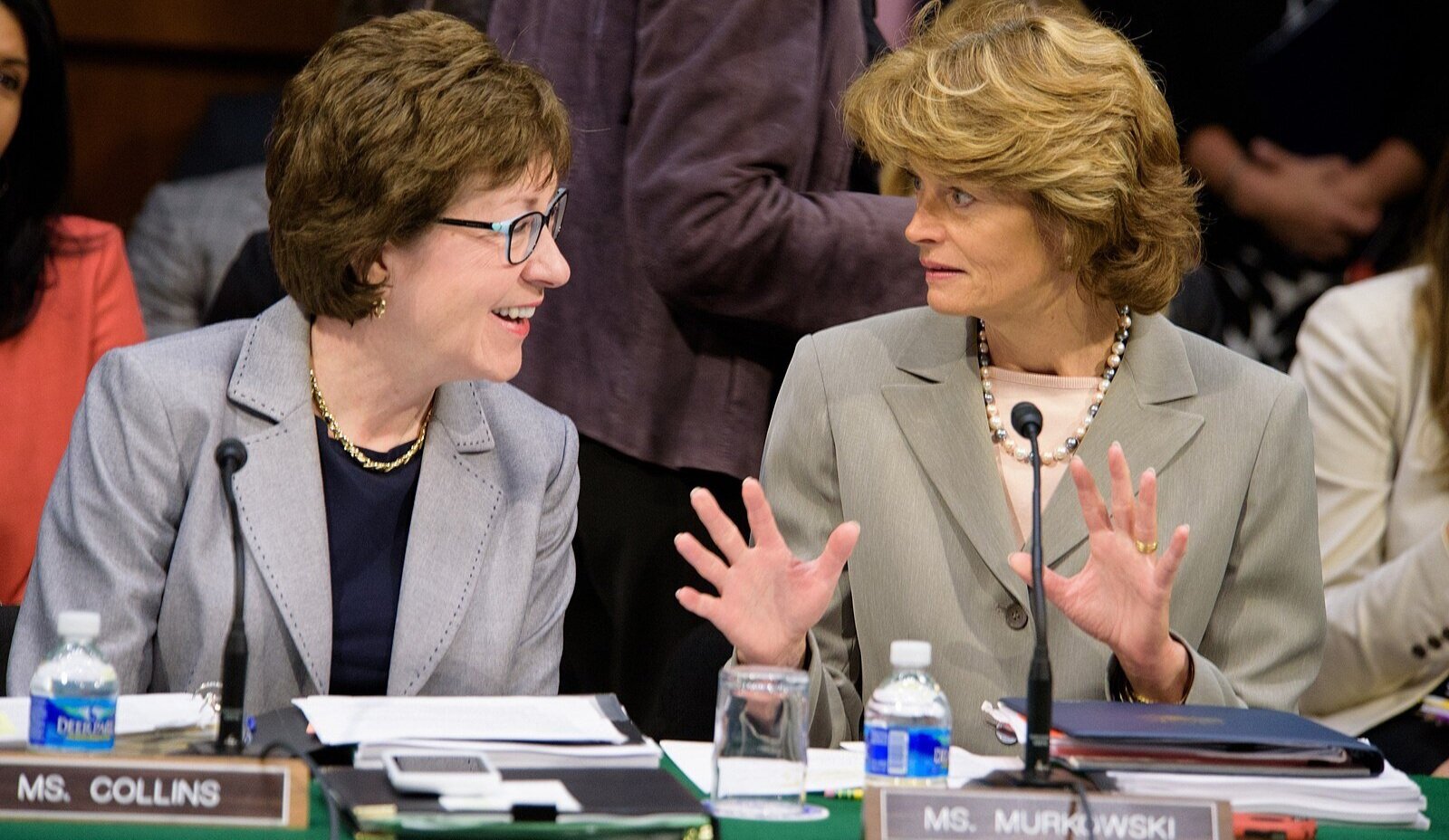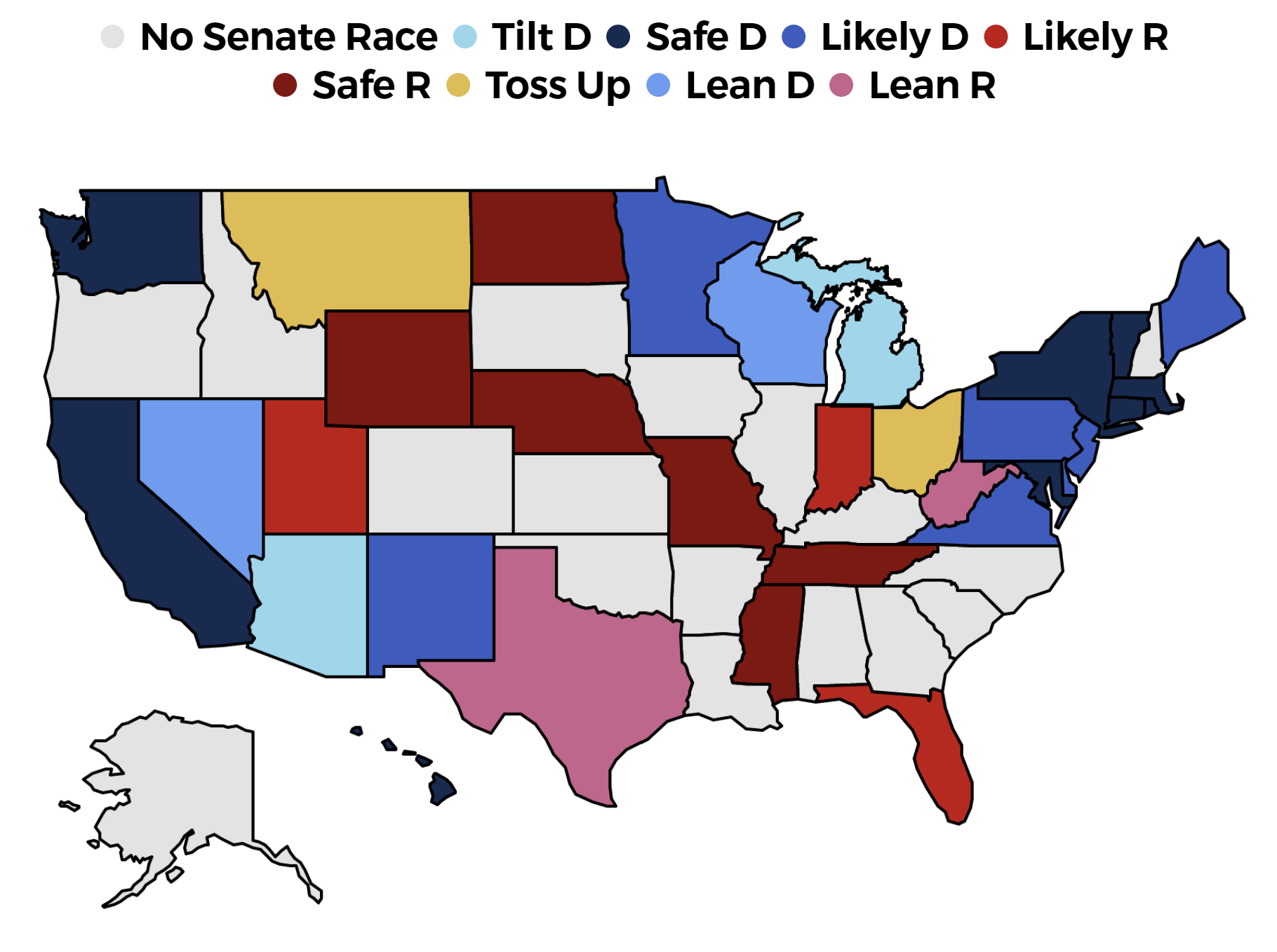Once Seen as Above the Fray, Collins has Cratered with Dems & Independents
Photo Credit: United States Senate - Office of Lisa Murkowski / Public domain
By: Logan Phillips
Date: 7/14
Susan Collins has been representing Maine as Senator since 1997, but in 2020 she faces the fight of her political life. Sarah Gideon, the Speaker of the House in Maine’s state legislature, and likely Democratic Nominee, has tied her in the polls, raised a stunning $9 million during the last three months, and now has a 53% shot of ending Collin’s tenure in the U.S. Senate. To be fair, the fact that Senator Collins is in such a competitive race is a tribute to her political acumen. Consider the political landscape that she faces: she is swimming against the tide of what increasingly looks like a blue wave, in a state where Biden is outpolling Trump by 10%.
Photo Credit: Made for RacetotheWH using Infogram
The average G.O.P Senator would be facing tall odds in a state like Maine, and probably be assured a loss, baring a considerable change in the national political environment by November. However, Susan Collins has never been an average Senator. Despite representing a blue, albeit independent minded state, she has consistently trounced her opponents by 15-40% in every election this millennium – attracting significant support from Independents and Democrats alike.
This time around, things are different, and it is not just because there’s an unpopular incumbent on the presidential ticket. In 2008, George W. Bush set the record for the lowest approval rating in American history, but Collins still crushed her Democrat opponent 61% to 39%. The nation’s most popular Republican Senator with their own votes in 2015, her constituents didn’t see her as a politician, but as an independent stateswoman that kept herself above the political fray. In a truly stunning reversal, she now rates near the bottom of all Senators running for re-election, with an average approval of 38%, and a disapproval of 55%.
Photo Credit: Graphic created using Infogram by Race to the WH Editor in Chief, Logan Phillips
To understand Collins’ political fall from grace, you must first understand the unique expectations that Maine has of its senators. Mainers have an infatuation with Senators that are unrestrained by partisan politics, who forge compromise across the aisle, who are willing to speak their mind and do the right thing, even if it costs them politically. Margaret Chase Smith is the exemplary in a long history of Maine’s independent-minded Senators, who have bucked partisan leadership to stand up for America’s, and Maine’s, moral values.
In the early and intense days of our Cold War with the Soviet Union, the United States was gripped by a deep fear of communism. Senator Joseph McCarthy weaponized these fears into a lethal political force, to pave his way into a position of great power, destroying the lives of countless American civilians and wreaking havoc on his perceived political enemies. Most Senators and Congressmen were afraid to stand up against him, knowing they too would be tagged as Communist sympathizers, and enemies of America.
Not Margaret Chase Smith. Dismissed by many of her colleagues simply for being a woman, Senator Margaret Chase Smith displayed the type of strength most people can’t even conceive, and took McCarthy on, for 15 minutes, in front of the entire Senate body. In her Declaration of Conscience, she said “The American people are sick and tired of selfish political opportunism, a form of hate and character assassination; Americans are sick and tired of seeing innocent people smeared…I do not want to see the Republican party ride to political victory on the four horsemen.”
Senator Chase Smith had the backbone, independence, and devotion to country, above party, to do the right thing. These qualities are cherished by Maine voters, who have a reputation of sending to Washington senators who represent these very values, and who are willing to take a political hit or give the other side a political victory by doing the right thing. Democrats like Ed Muskie and George Mitchell, and Republicans like William Cohen and Olympia Snowe, have shown willingness to forge consensus that moved America forward, even when it gave the other party a victory. They stood up to people in power, even when they did so, at risk to themselves.
For most of Susan Collins’ career, she has been a Senator in this same vein. In an era where bipartisan compromise has been hard to come by, Senator Collins was one of the few looking to build consensus across the aisle. She even showed grit and bravery in August of 2016, when she stood up to then Republican Presidential Nominee Donald Trump. She announced in a Washington Post editorial that she would not be supporting Trump’s re-election bid because she felt he did not represent American or Republican values, and worse, because he would divide the country. “With the passage of time, I have become increasingly dismayed by his constant stream of cruel comments, and his inability to admit error, or apologize,” she wrote. “But it was his attacks directed at people who could not respond on an equal footing, either because they do not share his power or stature, or because professional responsibility precluded them from engaging at such a level, that revealed Mr. Trump as unworthy of being our president.”
“It was his attacks directed at people who could not respond on an equal footing…that revealed Mr. Trump as unworthy of being our president.”
— Susan Collins (August, 2016)
This was an act of genuine political risk for a Republican Senator, but to do so, she put her values above politics. Perhaps she was willing because her election was four years away, or because Trump looked to many like he was likely to lose; she had the popularity to risk it. Perhaps Senator Collins decided it was just the right thing to do. However, once Trump became President, the political stakes grew significantly. Maine’s Senator seems to have decided that the cost of a full-throated opposition is no longer worth bearing.
To be fair, pushing back firmly against President Trump is an immensely risky bet for Republicans. The move would have made her re-election bid much harder, and maybe, forced her to run as an independent. For most Senators this would be an impossible pathway to victory, but perhaps not for Collins, whose pathway to 20-30% margin victories was only possible because she had so thoroughly crushed the independent vote and won such a significant portion of Democrats. After all, her fellow Maine Senator, Angus King, is an independent who first won against both Republican and Democrat candidates.
Senator Susan Collins and Senator Jack Reed were unintentionally recorded on a hot mic criticizing President Trump
It is hard to believe that Donald Trump has won Senator Collins over as an admirer. Collin’s Washington Post op-ed indicated she has been most bothered by his tendency to divide Americans, his mean comments and attacks, his lack of self-restraint, and his willingness to disregard American allies and break treaties. Regardless of how one feels about the president, it’s pretty clear that nothing has changed on these fronts. Leaked audio from a summer 2017 Collins conversation caught her agreeing with a Democrat senator about how crazy Trump is, saying, “he’s so unattractive, it’s unbelievable”.
However, whether responding to Trump’s abandonment of the Kurds in Syria, or his more recent condemnations of peaceful protesters supporting Black Lives Matter, her comments are typically mild-mannered criticisms. In response to his worst moments, she is often “concerned” by his deeds, finds his performance “uneven,” or decision “unwise.” However, even those one-line statements of soft rebuke have been growing less frequent over time.
From the perspective of Trump’s critics, Collins has not gone nearly far enough. They see Trump as exactly the kind of bully that needs to be confronted, in the same manner as Senator Chase Smith stood up to McCarthy. Obviously, many Republicans would contest this, but it’s a commonly held view among the type of Independent and Democrat Mainers that have supported Collins for years; in 2016, Collins made it crystal clear that she sees Trump the same way.
With a few exceptions, Senator Collins has been unwilling to directly confront Donald Trump, or to stand up for American values, during Trump’s worst moments of excess. These were moments when both Maine, and the U.S., needed moral leadership, and all Collins had was “concern.”
It was hardly Margaret Chase Smith staring down the figurative barrel of a gun, taking on McCarthy at the height of his power. Two years later, even WWII hero and President, Dwight Eisenhower was unwilling to speak out against McCarthy, despite loathing him, but Chase Smith did. So why couldn’t Collins? What did she have to lose? Her Senate Seat? That type of Washington calculation might be tolerated elsewhere, but it is just not good enough for the people of Maine.
The prospect of moving on from Susan Collins is a tough and painful pill to swallow for many Maine Independents and even Democrats, who have long admired Collins, appreciated her bipartisanship, and longed for her to have her “Margaret Chase Smith moment.” I have talked to several Maine Voters that despite having personally committed to vote, donate, and even organize for Sarah Gideon, have told me they still feel a true sense of loss and sadness over Susan Collins.
It almost feels like a tragedy – they think that Collins shares the same values as them, but when she was stuck between a figurative political rock and a hard place, she chose her clearest path to re-election, rather than what she believed in. Often, the worst two moments for them were when she voted to acquit Trump of his impeachment, and when she voted to confirm Brett Kavanaugh as a Supreme Court Justice. The political conundrum for Collins is that if she breaks away firmly from Trump now, just months away from her re-election, many will dismiss her move as a last second political calculation. Plus, it would anger the President’s supporters, and Trump would likely retaliate against Collins.
It should surprise no one if Collin’s ultimately perseveres and sneaks out a narrow win on Election Day. There are few Senators that have a better understanding of their state’s political landscape. However, it’s clear that the shine on Collins has faded; growing numbers of Mainers that used to back her are wondering how she lost her way and became just another politician prioritizing political interests above the good of the country.
The first page of an in depth breakdown of the Maine Senate Race. To see polls, approval ratings, fundraising, and analysis of this race, and all other Senate races, click here









